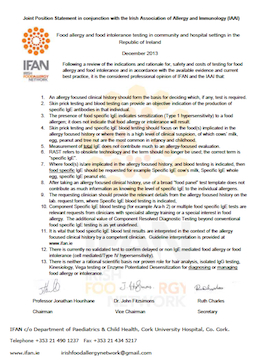 Joint Position Statement in conjunction with the Irish Association of Allergy and Immunology (IAAI).
Joint Position Statement in conjunction with the Irish Association of Allergy and Immunology (IAAI).
Food allergy and food intolerance testing in community and hospital settings in the Republic of Ireland.
December 2013
Following a review of the indications and rationale for, safety and costs of testing for food allergy and food intolerance and in accordance with the available evidence and current best practice, it is the considered professional opinion of IFAN and the IAAI that:
1. An allergy focused clinical history should form the basis for deciding which, if any, test is required.
2. Skin prick testing and blood testing can provide an objective indication of the production of specific IgE antibodies in that individual.
3. The presence of food specific IgE indicates sensitization (Type 1 hypersensitivity) to a food allergen; it does not indicate that food allergy or intolerance will result.
4. Skin prick testing and specific IgE blood testing should focus on the food(s) implicated in the allergy focused history or where there is a high level of clinical suspicion, of which cows’ milk, egg, peanut and tree nut are the most common in infancy and childhood.
5. Measurement of total IgE does not contribute much to an allergy-focused evaluation.
6. RAST refers to obsolete technology and the term should no longer be used; the correct term is “specific IgEâ€.
7. Where food(s) is/are implicated in the allergy focused history, and blood testing is indicated, then food specific IgE should be requested for example Specific IgE cow’s milk, Specific IgE whole egg, specific IgE peanut etc.
8. After taking an allergy focused clinical history, use of a broad “food panel†test template does not contribute as much information as knowing the level of specific IgE to the individual allergens.
9. The requesting clinician should provide the relevant details from the allergy focused history on the lab. request form, where Specific IgE blood testing is indicated.
10. Component Specific IgE blood testing (for example Ara-h 2) or multiple food specific IgE tests are relevant requests from clinicians with specialist allergy training or a special interest in food allergy. The additional value of Component Resolved Diagnostic Testing beyond conventional food specific IgE testing is as yet undefined.
11. It is vital that food specific IgE blood test results are interpreted in the context of the allergy focused clinical history by a competent clinician. Guideline interpretation is provided at www.ifan.ie
12. There is currently no validated test to confirm delayed or non IgE mediated food allergy or food intolerance (cell mediated/Type IV hypersensitivity).
13. There is neither a rational scientific basis nor proven role for hair analysis, isolated IgG testing, Kinesiology, Vega testing or Enzyme Potentiated Desensitization for diagnosing or managing food allergy or intolerance.
Professor Jonathan Hourihane, Chairman
Dr. John Fitzsimons, Vice Chairman
Ruth Charles, Secretary
IFAN c/o Department of Paediatrics & Child Health, Cork University Hospital, Co. Cork.
Telephone +353 21 490 1237
Fax +353 21 434 5217
Website: www.ifan.ie
Email: irishfoodallergynetwork@gmail.com
Download the Allergy Testing Position Statement Letter by clicking here
